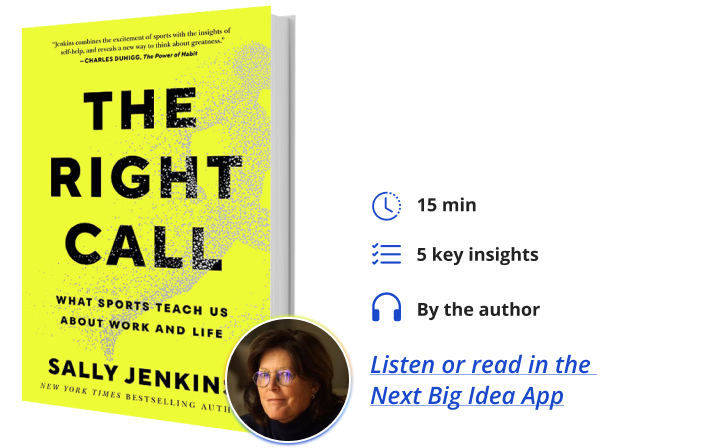Sally Jenkins has been a columnist and feature writer for The Washington Post for more than 20 years. She was a finalist for the Pulitzer Prize in 2020 and in 2021 was named the winner of the Associated Press Red Smith Award for Outstanding Contributions to Sports Journalism. In 2005 she was the first woman to be inducted into the National Sportswriters and Sportscasters Hall of Fame. Below, she shares 5 key insights from her new book, The Right Call: What Sports Teach Us About Work and Life. Listen to the audio version—read by Sally herself—in the Next Big Idea App.

1. Conditioning.
The worst calls or mistakes happen when someone is tired. Marshaling your energies therefore matters. How you respond when you’re completely gassed is a big part of making a decision under stress. What stresses you? Your body stresses you when you’re tired. So, you have to pay the price, to know what that feels like, and be able to still perform at a high level.
Laymen tend to think of athletic conditioning as something you do purely to build muscle. But a mountain of neuroscience shows that physical training increases gray matter in the frontal lobes of the brain, enhancing working memory, attention, focus, and executive function, the processes that form basic cognition.
You think you aren’t working at a desk? A high-level chess player burns 500 to 600 calories sitting over a board for a couple of hours. Understand this: your mind will rob your muscles of the energy to function. The cigar-chomping CEO with a three-martini lunch is a figure of the past. The world moves fast these days and you have to be cognitively fit to go with it.
2. Practice.
Without practice, even the best-designed play can make a shot caller look like a fool. Practice is more than just tedious repetition. It’s the willingness to diagnose weaknesses and fix them. Most of us practice casually and without much resistance. We decide to learn to play tennis and get pretty good at it, and run around our weak backhands. The real achievers look for their incompetencies, conscious and unconscious.
“Practice is more than just tedious repetition.”
The best athlete I ever saw at addressing her blind spots was Martina Navratilova. In 1989, Navratilova had won 17 grand slams, but she was aging and had reached a plateau. She hired Billie Jean King to work with her, to refresh her game. King started with an interesting teaching technique. She said, “You teach me.” Navratilova said, “But you’re supposed to teach me.” King replied, “I need to know what you know.” After several weeks of work together, Navratilova had shored up some critical but unconscious bad habits she had slipped into and went on to win her record ninth Wimbledon title. The great conjurer Ricky Jay once said, “What makes magic is practice.”
3. Candor.
What enables great champions to diagnose their weaknesses is candor. They have no use for yes-men and -women. None. They are candid with themselves and one another. They certainly have egos, but they have a fundamental lack of vanity when it comes to dissecting their performances because it’s the only route to true assessment.
In the work that any of us do, our situational awareness is limited. It’s impossible to perceive all that’s going on around us, to know what we’ve missed, where we were wrong or mistaken. That requires an external critique—if you can take it.
In Peyton Manning’s third year in the NFL, he had an indeterminate record of 32-32. He was a .500 quarterback, and moreover, he led the league in interceptions. Manning sat down with his new coach, Tony Dungy, and underwent several weeks of film work looking at his interceptions: not his highlight film of all of his touchdowns, but his worst throws. And he didn’t just look at his interceptions. He looked at the passes he threw that should have been intercepted and he just got lucky. Those several weeks of fundamental re-analysis made Manning into the Hall of Famer he became.
4. Discipline.
Even when they make snap decisions in a fast-moving context, good shot callers are always married to discipline. Though it may sound counterintuitive, discipline is actually what allows for effective improvisation—without it, you’re just an uncontrolled hacker or jacker. If you ever hear a young talent say they want to play on “instinct,” you can mark them down as a probable bust.
“Discipline is actually what allows for effective improvisation.”
Managerial tyrants misinterpret discipline as demandingness, but it’s not. It’s about fostering an interior morality and structure. The greats make level-headed choices based on structured habits laid down long before they reach the critical moment.
5. Failure.
A conspicuous through-line among people who perform well under pressure is their acquaintance with failure and the extent to which it shaped them. In fact, they universally describe it as an essential precondition for success. Only through their failures— if they assess them candidly—do they acquire the self-understanding and intentionality that leads to eventual victories.
Consider this statistic: every year in the NFL an average of seven head coaches out of thirty-two are fired, almost a quarter of the profession, annually. There is a lot to learn from
them about surviving professional pain with buoyancy. The fact is, it’s impossible to fully learn a profession and master a craft without making mistakes and surviving career reversals.
If these successful shot callers share a coherent set of learned principles, most importantly they amount to a way of being. A principle is not a management ploy, a stratagem, a maxim, or a ruse. Those things won’t prevail over instability. Principles are foundational modes of behavior. They permit men and women to make hard, difficult, and even undesirable choices without panic. They recognize that when we employ sound practices, we can, over time, increase our odds of being right, more often than not.
To listen to the audio version read by author Sally Jenkins, download the Next Big Idea App today:































